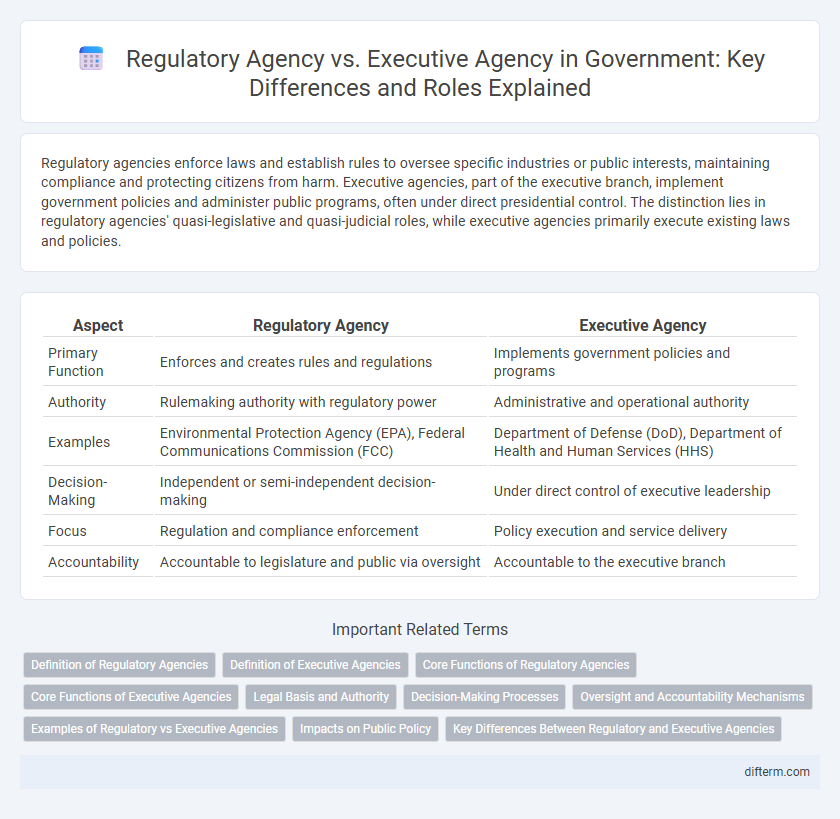Regulatory agencies enforce laws and establish rules to oversee specific industries or public interests, maintaining compliance and protecting citizens from harm. Executive agencies, part of the executive branch, implement government policies and administer public programs, often under direct presidential control. The distinction lies in regulatory agencies' quasi-legislative and quasi-judicial roles, while executive agencies primarily execute existing laws and policies.
Table of Comparison
| Aspect | Regulatory Agency | Executive Agency |
|---|---|---|
| Primary Function | Enforces and creates rules and regulations | Implements government policies and programs |
| Authority | Rulemaking authority with regulatory power | Administrative and operational authority |
| Examples | Environmental Protection Agency (EPA), Federal Communications Commission (FCC) | Department of Defense (DoD), Department of Health and Human Services (HHS) |
| Decision-Making | Independent or semi-independent decision-making | Under direct control of executive leadership |
| Focus | Regulation and compliance enforcement | Policy execution and service delivery |
| Accountability | Accountable to legislature and public via oversight | Accountable to the executive branch |
Definition of Regulatory Agencies
Regulatory agencies are government bodies established by legislation to enforce laws and create rules that control specific economic activities or protect public interests, often operating independently from executive departments. They have the authority to issue regulations, conduct investigations, and impose penalties to ensure compliance, differentiating them from executive agencies that primarily implement government policies. Examples include the Environmental Protection Agency (EPA) and the Securities and Exchange Commission (SEC), which oversee environmental standards and financial markets regulation, respectively.
Definition of Executive Agencies
Executive agencies are government organizations responsible for implementing laws and policies under the direction of the executive branch, focusing on specific administrative functions like public health, transportation, or national security. Unlike regulatory agencies that enforce rules and regulations to control activities within certain industries, executive agencies directly manage government programs and provide services to the public. These agencies operate within the framework of executive authority to ensure efficient administration and policy execution.
Core Functions of Regulatory Agencies
Regulatory agencies primarily establish and enforce rules designed to maintain public welfare, safety, and market fairness through rulemaking, adjudication, and monitoring activities. These agencies operate with a degree of independence to regulate industries, ensure compliance, and impose penalties for violations, distinguishing their oversight from the administrative and policy implementation roles typical of executive agencies. Key examples include the Environmental Protection Agency (EPA) and the Securities and Exchange Commission (SEC), which focus on safeguarding environmental standards and financial market integrity respectively.
Core Functions of Executive Agencies
Executive agencies primarily implement and enforce specific government policies, managing day-to-day operations within their designated sectors. They oversee regulatory compliance, administer programs, and deliver public services directly to citizens or businesses. Unlike regulatory agencies that primarily create and enforce rules, executive agencies focus on operational execution and program management.
Legal Basis and Authority
Regulatory agencies derive their authority from legislative statutes that grant them the power to create and enforce rules within specialized sectors, ensuring compliance with established laws. Executive agencies operate under the direct control of the executive branch, with authority delegated by the president or executive leaders to implement and manage specific government functions. Legal basis for regulatory agencies often includes enabling legislation, while executive agencies rely on executive orders and administrative mandates for their operational authority.
Decision-Making Processes
Regulatory agencies operate with rulemaking authority, allowing them to establish detailed regulations and enforce compliance through administrative hearings and sanctions. Executive agencies primarily implement laws and policies set by the legislature and rely on hierarchical decision-making within the executive branch. Decision-making in regulatory agencies is often more autonomous and involves public participation, whereas executive agencies follow directives from political leadership with less independent authority.
Oversight and Accountability Mechanisms
Regulatory agencies exercise oversight through rulemaking, enforcement actions, and compliance monitoring to ensure adherence to laws and industry standards, holding entities accountable via penalties or sanctions. Executive agencies implement policies and deliver public services under direct presidential control, with accountability mechanisms including performance evaluations and congressional oversight. Both types of agencies operate within legal frameworks, but regulatory agencies emphasize independent oversight while executive agencies focus on administrative accountability.
Examples of Regulatory vs Executive Agencies
Regulatory agencies such as the Environmental Protection Agency (EPA) and the Securities and Exchange Commission (SEC) enforce rules and regulations to ensure compliance within specific sectors. Executive agencies like the Department of State and the Department of Defense implement government policies and provide public services directly. While regulatory agencies focus on oversight and rulemaking, executive agencies concentrate on administration and operational functions.
Impacts on Public Policy
Regulatory agencies, such as the Environmental Protection Agency (EPA), establish and enforce rules that directly shape public policy outcomes by setting standards and monitoring compliance across industries. Executive agencies, including the Department of Health and Human Services (HHS), implement and administer laws passed by Congress, translating legislative intent into actionable programs and services that affect public welfare. The interplay between regulatory and executive agencies influences policy effectiveness, accountability, and the balance between oversight and administration in government operations.
Key Differences Between Regulatory and Executive Agencies
Regulatory agencies, such as the Securities and Exchange Commission (SEC), have the authority to create, enforce, and adjudicate rules within specific industries to protect public interests. Executive agencies, like the Department of Justice (DOJ), primarily implement laws and administer government programs under presidential control. The key difference lies in regulatory agencies' quasi-legislative and quasi-judicial powers versus executive agencies' direct administrative functions.
Regulatory agency vs Executive agency Infographic

 difterm.com
difterm.com